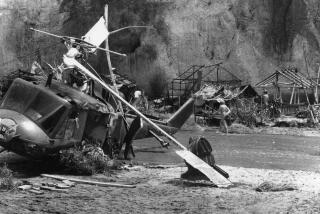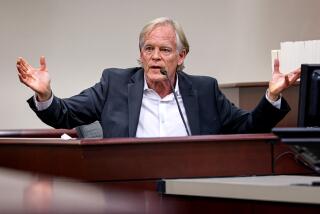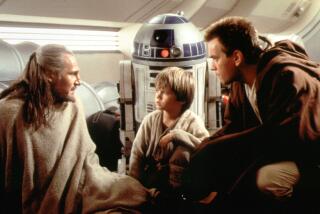Landis Threatened to Film One Scene Himself, Witness Says
- Share via
On the eve of the helicopter crash that killed three actors on the “Twilight Zone” movie set, director John Landis angrily told a cameraman who questioned the safety of another scene involving explosives that “if (he) didn’t want to do the shot, he could go home,” the cameraman’s assistant testified Monday.
The witness, Lee Redmond, told a Los Angeles Superior Court jury that Landis became irate when he overheard the cameraman ask special-effects coordinator Paul Stewart about a shot in which explosives were to be detonated off a cliff.
The cameraman, John Connor, was concerned, because “the explosives had nowhere to go except out away from the cliff, which is where the camera was placed,” Redmond testified.
Before Stewart could respond, however, Landis intervened, the witness said.
“Mr. Landis stated that the camera was placed in a safe position, and that if John Connor didn’t want to do the shot, he could go home and Mr. Landis would do it instead,” Redmond said. “ . . . He (Landis) was very irate.”
Landis, Stewart, associate producer George Folsey Jr., unit production manager Dan Allingham and helicopter pilot Dorcey A. Wingo are accused of involuntary manslaughter in the July, 1982, accident, which killed actor Vic Morrow and two children, Renee Chen, 6, and Myca Dinh Lee, 7.
Connor is away on location but is expected to testify in two weeks, a district attorney’s investigator said.
The prosecution has contended that safety considerations were often disregarded on the movie set in order to create more realistic effects and complete the shooting close to schedule.
Under cross-examination by James Sanders, one of Landis’ attorneys, Redmond acknowledged that Landis’ assessment of the scene turned out to be accurate.
“It was safe, wasn’t it?” Sanders asked.
“Yes,” the witness replied.
Earlier Monday, an assistant director testified that he felt no pressure to overlook matters of safety.
“To my knowledge, there was no pressure,” Elie Cohn said. “There was no pressure on me, and I’ve not heard there was pressure on anyone else.” But eight days after the helicopter crash, Cohn had told an investigator for the California Division of Occupational Safety and Health that pressure is exerted on film personnel “to get the job done, regardless of safety, especially in times of low employment in the movie industry,” according to a report prepared by the agency.
Cohn testified Monday that he does not recall making that statement.
More to Read
Only good movies
Get the Indie Focus newsletter, Mark Olsen's weekly guide to the world of cinema.
You may occasionally receive promotional content from the Los Angeles Times.










